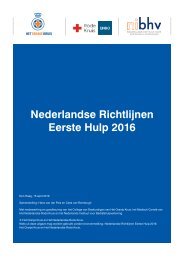Thesis-Anne-Vos-Masters-SBR-and-EU-Law-3
Thesis-Anne-Vos-Masters-SBR-and-EU-Law-3
Thesis-Anne-Vos-Masters-SBR-and-EU-Law-3
Create successful ePaper yourself
Turn your PDF publications into a flip-book with our unique Google optimized e-Paper software.
orders. Here, unilateral actions by MS will be less effective than <strong>EU</strong> action. In this manner, the<br />
passivity of one MS will not frustrate the actions of another MS. This applies e.g. to water <strong>and</strong> air<br />
pollution, or to the protection of habitats <strong>and</strong> wild fauna <strong>and</strong> flora. 234 The second 'justification'<br />
ground comes typically into play in cases concerning import or export restrictions (Articles 34-36<br />
TF<strong>EU</strong>). If MS insert certain conditions (for environmental reasons) this could result in the restriction<br />
of import or export. Here, the <strong>EU</strong> can harmonise <strong>EU</strong>-wide conditions, applicable to all MS, so that<br />
environmental product st<strong>and</strong>ards can be applied without distortion of the internal market.<br />
In practice, it is not easy to develop general rules on when action should 'better be achieved at<br />
Union level'. With regard to environmental policies, the opinion differs between MS with a proactive<br />
environmental policy (e.g. Netherl<strong>and</strong>s, 235 Denmark, Sweden, Austria, Germany) <strong>and</strong> those<br />
who are not convinced of the importance of environmental protection (e.g. Greece, Spain, Portugal,<br />
Italy). Those latter MS often only implement the <strong>EU</strong> environmental legislation <strong>and</strong> do not come up<br />
with own additional environmental policies. Moreover, it depends on the leading political party in<br />
the MS, but also on the economic development within a MS. As Krämer says "[p]overty is the<br />
biggest environmental pollutant". 236 Therefore, the Western of Europe is more ready to invest in<br />
environmental policies, while the Eastern is not as enthusiastic. According to Krämer, this has led<br />
to the two different orientations in the <strong>EU</strong>. On the one h<strong>and</strong> there are the MS who are of the<br />
opinion that the <strong>EU</strong> should only regulate if absolutely necessary (ex. Art. 5 T<strong>EU</strong> <strong>and</strong> Art. 193/194<br />
TF<strong>EU</strong>), in order to develop more stringent protection. On the other h<strong>and</strong> there are the MS who do<br />
not develop environmental policies on their own. Some countries have even officially declared not<br />
to adopt national environmental legislation that goes beyond <strong>EU</strong> measures (e.g. UK, Germany,<br />
Austria). This works against the objective of Art. 5 T<strong>EU</strong> <strong>and</strong> Art. 193/194 TF<strong>EU</strong>. 237<br />
Another interesting question that Krämer points out is: what does 'better' actually mean? Several<br />
meanings can be distinguished:<br />
quicker, more effective, cheaper, more efficient, closer to the citizen (i.e. not too centralised), more<br />
democratic, more uniform, more consistent with measures in other parts of the industrialised world,<br />
or the global or the European Union, without these concepts beings more precise. 238<br />
According to the EP, the notions of Art. 5 T<strong>EU</strong> are expressly kept vague, in order to grant as much<br />
discretionary power to the legislator. 239 Hence, it must be decided per individual case whether the<br />
action should better be taken at <strong>EU</strong> level, in order to enhance environmental objectives. The<br />
outcome of these decisions is always political. 240 Attention should be paid to the fact that MS might<br />
have very different national environmental policies. However, the main concern should always stay<br />
the improvement of the environment.<br />
5.2.2 Dutch level<br />
The subsidiarity principle is an <strong>EU</strong> concept. It is important for the Dutch level, but only in<br />
combination with the <strong>EU</strong> level. The main basic question of this principle is: should this matter be<br />
h<strong>and</strong>led on <strong>EU</strong> level or on national level? Which level is better suited, equipped or more effective?<br />
It is thus always in combination with the <strong>EU</strong> level that this principle will be discussed. However,<br />
there is another aspect (already pointed out in the previous paragraph), with the same aim as the<br />
subsidiarity principle, which is closely linked with this principle. It concerns the decentralisation<br />
principle, which means in short: ‘decentralised what is possible, centralised what must’. This<br />
234<br />
Case 247/85 Commission v Belgium [1987] ECR 3029.<br />
235<br />
It could however be questioned whether the Netherl<strong>and</strong>s is still part of the MS with a pro-active environmental policy,<br />
see dissertation L. Squintani, Gold-plating of European environmental law, Rijksuniversiteit Groningen, 2013.<br />
236<br />
Krämer (2011), pp. 17-18.<br />
237<br />
Krämer (2011), p. 440.<br />
238<br />
Krämer (2011), p. 18.<br />
239<br />
Res. Of 20 April 1994, OJ C128/190, n. 5.<br />
240<br />
Jans & Vedder (2012), p. 17.<br />
56



